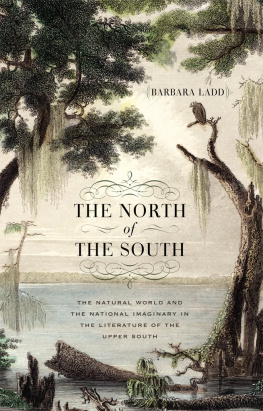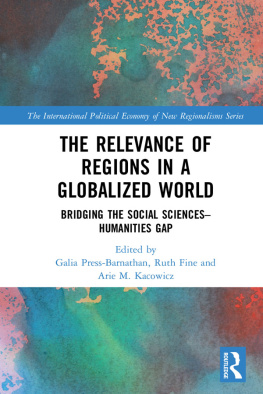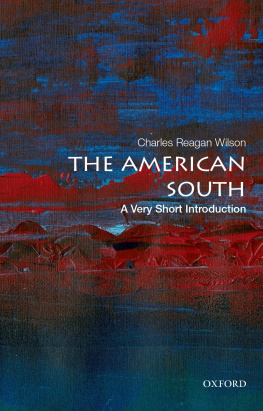Navigating Souths
SERIES EDITORS
Jon Smith, Simon Fraser University
Rich Richardson, Cornell University
ADVISORY BOARD
Houston A. Baker Jr., Vanderbilt University
Leigh Anne Duck, The University of Mississippi
Jennifer Greeson, The University of Virginia
Trudier Harris, The University of Alabama
John T. Matthews, Boston University
Tara McPherson, The University of Southern California
Claudia Milian, Duke University
Navigating Souths
TRANSDISCIPLINARY EXPLORATIONS OF A U.S. REGION
EDITED BY
Michele Grigsby Coffey AND Jodi Skipper
2017 by the University of Georgia Press
Athens, Georgia 30602
www.ugapress.org
All rights reserved
Set in 10/13 Kepler STD Regular by Graphic Composition, Inc.
Most University of Georgia Press titles are available from popular e-book vendors.
Printed digitally
Library of Congress Cataloging-in-Publication Data
Names: Coffey, Michele Grigsby, editor. | Skipper, Jodi, editor.
Title: Navigating Souths : transdisciplinary explorations of a U.S. region / edited by Michele Grigsby Coffey and Jodi Skipper.
Other titles: New southern studies.
Description: Athens : The University of Georgia Press, [2017] | Series: The new southern studies | Includes bibliographical references and index.
Identifiers: lccn 2016055853 | ISBN 9780820351087 (hardback : alk. paper) | ISBN 9780820351087 (ebook)
Subjects: LCSH: Southern StatesCivilizationStudy and teaching (Higher)United States. | Interdisciplinary approach in educationUnited States.
Classification: LCC f208.5 .n38 2017 | DDC 975.007/1dc23
LC record available at https://loc.gov.2016055853
CONTENTS
MICHELE GRIGSBY COFFEY AND JODI SKIPPER
Reimagining Southern Studies
Time and Space, Bodies and Spirits
CHARLES REAGAN WILSON
JOHN HAYES
Katrina Babies
Reproducing Deviance in the Future Unknown
ALIX CHAPMAN
Southern Inhospitality
Latino Immigrant Attrition and Resistance in the South
GWENDOLYN FERRETI
Public History, Diversity, and Higher Education
Three Case Studies on the African American Past
JODI SKIPPER, KATHRYN GREEN, AND RICO D. CHAPMAN
Where Do We Go from Here?
The Implications of Black Intellectual History in the Modern South
ROBERT GREENE II
South Unbound
A Case Study in Ron Rashs Appalachian Fiction
DANIEL CROSS TURNER
Interlocality and Interdisciplinarity
Learning from Existing Models of the Global South
KIRSTEN DELLINGER, JEFFREY T. JACKSON, KATIE B. MCKEE, AND ANNET TE TREFZER
Finding Strength in Southern Studies Pedagogy
Cultivating Individual Resilience through a Representative Narrative
MICHELE GRIGSBY COFFEY
Southern Transformations
Three Documentary Films by Anne Lewis
ANNE LEWIS AND LEIGH ANNE DUCK
Surviving the Economic Apocalypse
Capitalism, Consumption, and the Indian Imaginary in Karen Russells Swamplandia!
MELANIE BENSON TAYLOR
Last (Un)Fair Deal Going Down
Blues Tourism and Racial Politics in Clarksdale, Mississippi
KATHRYN RADISHOFSKI
The Politics of Hillbilly Horror
EMILY SAT TERWHITE
For They Know Not What They Do
Southern Studies Centers, Normativity, and Fantasies of White Redemption
JON SMITH
ACKNOWLEDGMENTS
This collection materialized from our vision of bringing together scholars, practitioners, and activists in various disciplines working in and on the U.S. South. We are grateful to many individuals who made that effort possible. Our first thanks are to Ted Ownby and Charles Reagan Wilson for their early generosity in supporting the Transforming New South Identities Symposium, which shaped our approach to this book and enriched our understanding of southern studies as academic practice. We are also grateful to Walter Biggins, our editor at the University of Georgia Press, for having faith in the symposium and book project from the beginning and for sending the manuscript to discerning readers whose comments and vision strengthened this book.
We would also like to express our gratitude to Elaine Abadie, Barbara Harris Combs, Jeffrey T. Jackson, Katie McKee, and Ted Ownby, who collaborated with us as members of the steering committee for the Transforming New South Identities Symposium held at the University of Mississippi in 2014; to all of the University of Mississippi faculty who suggested participants; and to Robert Brinkmeyer, Deirdre Cooper Owens, Barbara Harris Combs, Simone Delerme, Kirsten Dellinger, Leigh Anne Duck, Robbie Ethridge, John J. Green, Darren E. Grem, Ross Haenfler, Andy Harper, Jeffrey T. Jackson, Willa M. Johnson, Katie McKee, Ted Ownby, and Zandria Robinson for answering our call to serve as symposium facilitators, discussants, and peer reviewers. Thanks also to Becca Walton for her thoughtful and judicious assistance in symposium planning. We are also particularly appreciative of the generous funding from the Center for the Study of Southern Cultures Endowment for the Future of the South, which made the symposium possible.
This book grew out of papers presented at the Transforming New South Identities Symposium. We are especially indebted to those who daringly came together for the symposium in 2014, including Martyn Bone, Zac Henson, Sabrina Pendergrass, Tom Okie, and Susan ODonovan, whose works are not published in this volume but who participated in the symposiums peer review process. Their critiques are visible in the works of their peers. We also wish to express our appreciation to the authors whose essays are included here. It was a privilege to observe and participate in your scholarly and creative processes.
Finally, we are thankful for the generous mentorship of Marjorie Spruill, who always made time to talk us through particularly complex steps in editing a collection.
Navigating Souths
Introduction
MICHELE GRIGSBY COFFEY AND JODI SKIPPER
This book began with conversations in a living room in Oxford, Mississippi, in 2011. As a historian and an anthropologist who both study the South, we were at roughly the same place in our academic careers. We had each worked outside of and within the academy in multiple southern states and were each beginning our first year as faculty at the University of Mississippis Center for the Study of Southern Culture. We had many conversations about our personal academic projects, as well as broader political, social, cultural, and economic issues impacting the region we choose to study. Although we are both out spoken and anticipated, perhaps welcomed, hotly contested disputes, we were surprised to discover that the most spirited moments in our energizing debates did not stem from differences in opinion but were instead rooted in disciplinary differences, in the basic ways in which we framed and verbalized our work. For example, we both prioritized community engagement as one of our academic goals, yet we spent a great deal of time arguing about whether we should identify ourselves as activist-scholars, public scholars, or perhaps something else entirely. We found through our conflicts on the matter that such determinations were not solely personal decisions but were influenced by what we perceived as acceptable in each of our fields or even individual departments. In some cases, the labeling of oneself as an activist might be applauded; in others such a label could mean setting oneself apart.







